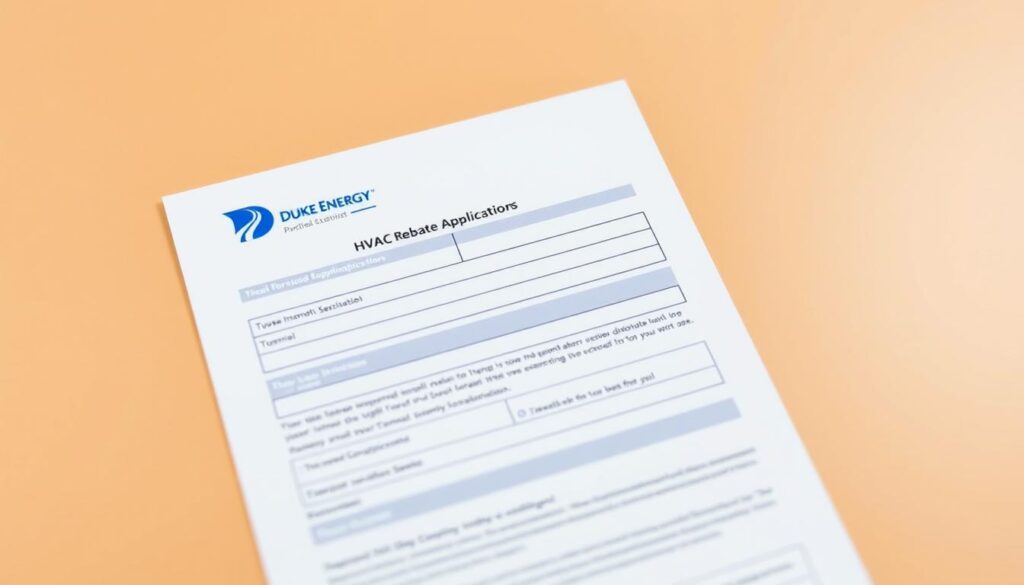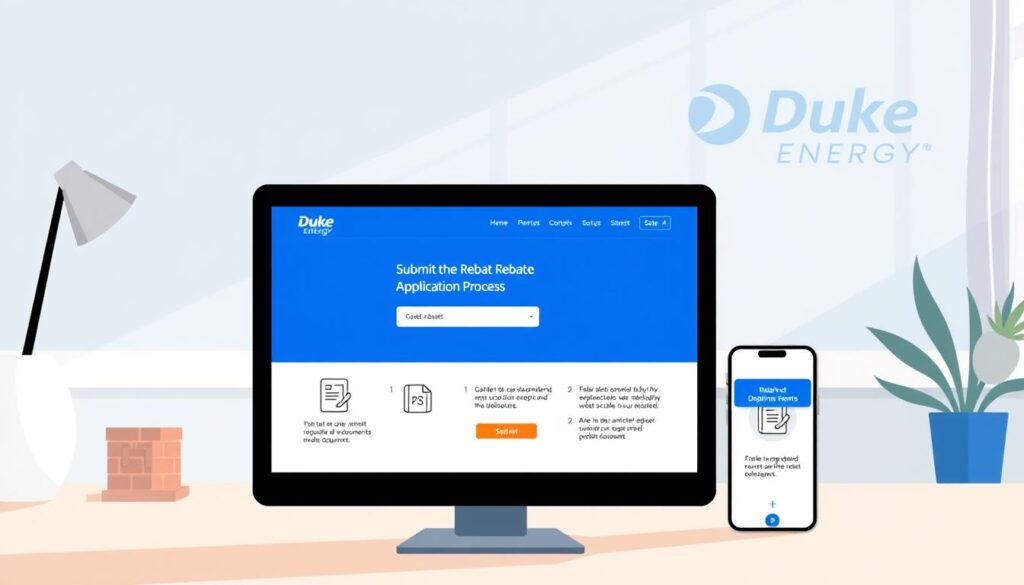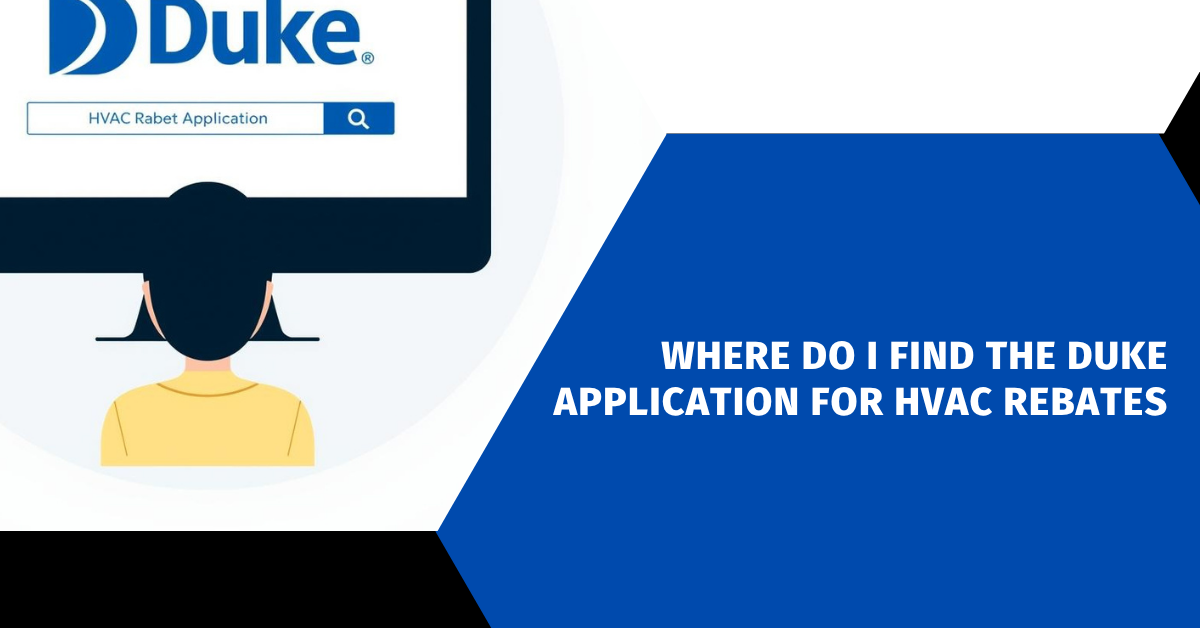Affiliate Disclosure
HVAC Guide Guys is a participant in the Amazon Services LLC Associates Program, an affiliate advertising program designed to provide a means for sites to earn advertising fees by advertising and linking to Amazon.
Where Do I Find the Duke Application for HVAC Rebates? Ready to cut your energy bills and boost your home’s comfort? Duke Energy’s HVAC rebate program can help. Finding the right form might seem tough, but it’s easier than you think.

Duke Energy gives homeowners a great chance to save on energy-efficient systems. This is perfect if you want to lower your carbon footprint or monthly bills. Knowing where to find the application is your first step to big savings.
This guide will cover everything about Duke Energy’s Smart $aver HVAC rebate program. It will help you save money and make smart choices for your home’s energy upgrades.
Key Takeaways
- Duke Energy provides substantial rebates for energy-efficient HVAC upgrades
- Multiple application methods are available online and by paper
- Rebates can significantly offset the cost of new HVAC systems
- Energy-efficient systems reduce long-term utility expenses
- Professional contractors can help navigate the rebate process
Table of Contents
Understanding Duke Energy’s Smart $aver HVAC Rebate Program
The Duke Energy smart saver program lets homeowners upgrade their heating and cooling systems. It’s a great way to save money. You can also cut down on energy use and lower your bills with these improvements.
What Qualifies for HVAC Rebates
Not every HVAC system gets rebates from Duke Energy. To get one, you must meet certain requirements:
- Install energy-efficient heating and cooling equipment
- Work with approved Duke Energy contractors
- Ensure new equipment meets minimum efficiency standards
- Complete a Home Energy Check within the past 24 months
Benefits of Energy-Efficient HVAC Systems
Getting an energy-efficient HVAC system has many benefits:
- Lower monthly energy costs
- Better home comfort
- A smaller carbon footprint
- Potential increase in property value
Program Overview and Eligibility Requirements
The smart saver program is for homeowners wanting to boost their home’s energy efficiency. Your eligibility depends on your current HVAC system’s age, efficiency, and your home’s energy use.
Pro tip: Schedule a Home Energy Check to find out your rebate chances and savings.
Joining the Duke Energy smart saver program can save you money. It also makes your home more comfortable and eco-friendly.
Available HVAC Rebate Options and Amounts
Duke Energy has great rebate options for homeowners who want to upgrade their HVAC systems. The duke energy efficient hvac rebate application offers big financial incentives for making your home more energy-efficient. You can get rebates from $300 to $1,000, depending on your HVAC system’s type and efficiency.
Upgrading to a more efficient heating and cooling system can be costly. But, the duke energy hvac replacement incentives can help cover some of the costs. The rebate amounts depend on several important factors:
- Heat pump replacements
- Central air conditioning system upgrades
- Heating strip replacements
Here’s a quick look at the typical rebate amounts:
| HVAC System Type | Efficiency Rating | Rebate Amount |
|---|---|---|
| Heat Pump | 15 SEER or higher | $500 |
| Central AC | 16 SEER or higher | $300 |
| Ductless Mini-Split | 20 SEER or higher | $1,000 |
When thinking about upgrading your HVAC, look at the Seasonal Energy Efficiency Ratio (SEER) and Heating Seasonal Performance Factor (HSPF) ratings. Systems with higher ratings usually get bigger rebates. This can save you money and make your home more energy-efficient.
Remember, these rebate options can change, so always check with Duke Energy for the latest info before you decide.
Explore Our HVAC Shop
Looking for top-rated HVAC tools, parts, and accessories? Visit our shop and find the perfect solution for your needs.
Visit the ShopWhere Do I Find the Duke Application for HVAC Rebates
Finding the Duke Energy HVAC rebate application can seem hard. But, with the right help, you can get your energy savings fast. Duke Energy makes it easy for homeowners to apply for HVAC rebates.
Online Application Process
Getting the Duke application for HVAC rebates is easy online. Here’s how to apply for Duke HVAC incentives online:
- Visit the Duke Energy official website
- Navigate to the Savings & Rebates section
- Select the Smart $aver HVAC Rebate Program
- Create or log into your online account
- Complete the digital rebate application form
Paper Application Options
If you like paper, Duke Energy has you covered:
- Download the PDF application form from Duke Energy’s website
- Print the complete application
- Fill out all required sections carefully
- Mail the completed form to the specified address
Documentation Requirements
To apply for Duke HVAC incentives, you’ll need some documents:
| Document Type | Purpose |
|---|---|
| Proof of Purchase | Original sales receipt for HVAC equipment |
| Equipment Specifications | Manufacturer’s details showing SEER and HSPF ratings |
| Installation Invoice | Detailed invoice from certified HVAC contractor |
| Account Information | Duke Energy account number and service address |
By following these steps, you can find and complete the Duke application for HVAC rebates. Make sure to check all requirements and submit your documents on time. This will help you save energy and money.
Duke Energy Heat Pump Rebate Requirements
When you look into duke energy cooling system rebates, knowing the heat pump requirements is key. Duke Energy has special incentives for homeowners who upgrade to energy-saving heat pumps.
To get duke energy hvac rebate form submissions, your heat pump must meet certain standards. You’ll need to check the SEER (Seasonal Energy Efficiency Ratio) and HSPF (Heating Seasonal Performance Factor) ratings.
- Minimum SEER rating: 15 or higher
- Minimum HSPF rating: 8.5 or higher
- Must replace existing less efficient heating system
- Professional installation required
The rebate amount depends on your new heat pump’s efficiency. More efficient systems get bigger rebates. The more efficient your heat pump, the more money you can save upfront and over time.
“Upgrading to an energy-efficient heat pump isn’t just about rebates—it’s an investment in your home’s comfort and sustainability.” – Duke Energy Efficiency Expert
Before you apply, make sure you have all the needed documents. This includes equipment specs, proof of purchase, and installation details. Working with a professional HVAC contractor who knows Duke Energy’s rules can make things easier.
HVAC System Efficiency Standards for Rebates
Knowing the efficiency standards is key for duke energy efficient hvac rebate application. Duke Power offers rebates for specific HVAC systems. These systems must meet certain technical specs to save energy.
Energy efficiency ratings are important for duke power heating and cooling rebates. These ratings help you pick the right HVAC system. It should save energy and get you financial help.
SEER and HSPF Rating Requirements
Two important metrics show how efficient an HVAC system is:
- SEER (Seasonal Energy Efficiency Ratio): Shows cooling efficiency
- HSPF (Heating Seasonal Performance Factor): Measures heating performance
Minimum Efficiency Standards
| HVAC System Type | Minimum SEER Rating | Minimum HSPF Rating |
|---|---|---|
| Heat Pumps | 16 SEER | 9.0 HSPF |
| Air Conditioners | 16 SEER | N/A |
Equipment Specifications
When picking an HVAC system for duke energy efficient hvac rebate application, look at these specs:
- Must meet or exceed minimum efficiency ratings
- Should be installed by certified contractors
- Must fit Duke Energy’s program needs
Choosing a high-efficiency HVAC system gets you rebates. It also cuts down on energy costs over time.
Explore Our HVAC Shop
Looking for top-rated HVAC tools, parts, and accessories? Visit our shop and find the perfect solution for your needs.
Visit the ShopContractor Selection and Requirements

Choosing the right contractor is key when you’re looking for duke energy hvac replacement incentives. Duke Energy lets you pick your contractor but has strict standards to ensure quality work.
When looking for a qualified HVAC pro, focus on a few important things. The contractor needs to be licensed, insured, and skilled in installing energy-efficient systems that qualify for rebates.
- Verify contractor’s state licensing credentials
- Check professional insurance documentation
- Request proof of previous Duke Energy rebate-eligible installations
- Review customer references and ratings
To make sure you know where to submit duke hvac rebate paperwork, pick a contractor who knows Duke Energy’s rules well. A seasoned pro can make the rebate application easier and ensure your installation meets all standards.
| Contractor Qualification | Requirement Details |
|---|---|
| State Licensing | Active professional HVAC license |
| Insurance | Comprehensive liability coverage |
| Energy Efficiency Knowledge | Certification in high-efficiency system installations |
Your chosen contractor should know a lot about energy-efficient HVAC systems and Duke Energy’s rebate programs. Take the time to research to make sure the installation and rebate process go smoothly.
Home Energy Check Prerequisites
The duke energy smart saver program needs a detailed home energy assessment. This is to help you get the most from your HVAC incentives. Knowing how to get a home energy check is key for those wanting to apply for duke hvac incentives.
A home energy check gives you insights into your home’s energy use. It shows where you can save energy and get rebates. This is a big help for improving your home’s energy efficiency.
Scheduling Your Energy Assessment
To book your home energy assessment, follow these steps:
- Contact Duke Energy’s customer service
- Request a free home energy evaluation
- Choose a time that works for you
- Get your home ready for the inspector
Timeline Requirements
The duke energy smart saver program has certain rules for home energy checks:
| Installation Type | Energy Check Validity |
|---|---|
| Standard HVAC Installations | Within 24 months before applying for rebates |
| Emergency HVAC Replacements | Within 12 months after installation |
Pro tip: Have your home energy check documents ready when applying for HVAC incentives. It makes the rebate process easier.
A detailed home energy assessment can reveal energy-saving opportunities. It also helps you qualify for valuable rebates through Duke Energy’s program.
Explore Our HVAC Shop
Looking for top-rated HVAC tools, parts, and accessories? Visit our shop and find the perfect solution for your needs.
Visit the ShopSteps to Submit Your HVAC Rebate Application
Getting your Duke Energy HVAC rebate can seem hard, but it’s easier with the right help. Knowing where to find the Duke application is key for homeowners wanting savings.

- Check if your equipment meets Duke Energy’s standards
- Gather all needed installation papers
- Work with a certified HVAC contractor
- Get ready the rebate application form
Contractors are very important in this process. They can fill out and send the Duke Energy HVAC rebate form for you, making it easier.
Having the right documents is key for rebates. You’ll need:
- Proof of buying new HVAC equipment
- Equipment model and serial numbers
- When it was installed and who did it
- The filled-out rebate application form
Ask your HVAC contractor to help with the application. They know the Duke Energy rebate program well and can make sure everything is right.
| Application Step | Required Action |
|---|---|
| Equipment Verification | Check if SEER and HSPF ratings are up to standard |
| Documentation Preparation | Get your purchase invoices and installation certificates ready |
| Submission Method | Apply online or through a certified HVAC contractor |
By following these steps, you’ll have a better chance of a smooth rebate application. You’ll also get the most energy savings with Duke Energy.
Tracking Your Rebate Status
After you send in your duke energy efficient hvac rebate application, you’ll want to know its status. Duke Energy makes it easy to track your rebate paperwork. This ensures everything goes smoothly.
Online Tracking Portal
The best way to check your rebate status is through the Home Energy Improvement (HEI) Rebate Portal. This online tool lets you see where to submit your duke hvac rebate paperwork. You can also track its progress.
- Log into the HEI Rebate Portal using your Duke Energy account credentials
- Navigate to the “Rebate Status” section
- Enter your application reference number
- View real-time updates on your submission
Customer Support Alternatives
If you prefer talking to someone or have trouble tracking, Duke Energy has your back. They offer several support options:
- Phone Support: Call the dedicated rebate helpline at (800) 555-1234
- Email Inquiries: Submit questions to rebates@dukeenergy.com
- Live Chat: Available on the Duke Energy website during business hours
Pro Tip: Have your application confirmation number ready when you contact support. It helps speed up the process.
Explore Our HVAC Shop
Looking for top-rated HVAC tools, parts, and accessories? Visit our shop and find the perfect solution for your needs.
Visit the ShopSpecial Considerations for Multifamily and Manufactured Homes
Duke Energy offers HVAC rebates for more than just single-family homes. Multifamily and manufactured homes can also get cooling system rebates. This makes it easier to upgrade to energy-efficient systems.
Residents of multifamily homes and manufactured homes have special chances to get duke energy rebates. The program helps apartment complexes, condos, and manufactured home communities save energy. This is done by improving their HVAC systems.
- Apartment complexes with centralized HVAC systems qualify for specialized rebate options
- Individual unit owners can apply for personal HVAC upgrades
- Manufactured home residents receive tailored incentive packages
Important things to think about for HVAC rebates in multifamily and manufactured homes include:
- Proof of property ownership or residency
- Documentation of existing HVAC system specifications
- Professional installation by certified contractors
- Meeting specific energy efficiency standards
Property managers and homeowners should contact Duke Energy directly to confirm specific eligibility requirements for their unique living situations. The rebate program aims to support energy efficiency across diverse housing types. It ensures everyone can enjoy modern, cost-effective cooling solutions.
Conclusion
Exploring the Duke Energy Smart Saver program can lead to big savings for homeowners. It helps you upgrade your HVAC system and cut down on energy costs. The rebate process might seem hard, but it’s doable with the right steps.
Start your savings journey with a Home Energy Check and choosing the right HVAC equipment. The Smart Saver program has many ways to lower your energy use. Upgrading to heat pumps or high-efficiency systems can save you money and help the environment.
Success comes from being prepared and paying attention to details. Make sure your equipment is efficient, work with certified contractors, and fill out all forms correctly. Duke Energy offers many resources to help you through the rebate application.
Don’t miss out on making your home more comfortable and efficient. Contact Duke Energy, book your energy assessment, and check out the HVAC rebate options. Taking action now can save you money and help the planet in the long run.

